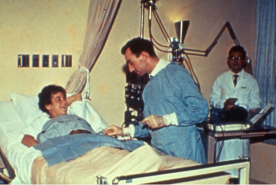November 01, 2022
Nearly 10,000 children1 in the country are living with kidney failure and require either dialysis or a kidney transplant to stay alive. How can you best support a child with kidney disease? Katie Adduci, a nurse and living kidney donor to her son Max, and Nicole Dumont, a licensed social worker, are here to provide actionable ways to help children who are going through pediatric kidney disease.
Max and Katie’s story
Katie discovered something was wrong with her child's kidneys during her 20-week ultrasound. It wasn't until he was born, however, that she and her husband learned the full extent of it.
"We didn't know until Max was born that he was in stage four kidney failure," said Katie. "When he was ten months old, we started him on peritoneal dialysis."
As a nurse, Katie understood how to operate the equipment and understood from a medical professional perspective what her child was going through, which helped her provide the best care possible to Max.
"I've been a nurse for 16 years," said Katie. "I'm lucky that I understood what was going on. I think it can be really hard for parents to wrap their heads around because kidney disease is invisible sometimes."
After ten months of peritoneal dialysis, Katie was able to donate her kidney to Max. The surgery was a resounding success, and Max is doing wonderfully.
"He is his own reward because he's so funny and sweet," Katie said. "He’s a little hilarious guy that makes me wish that I could donate an organ to every kid that needs one."
Now Katie hopes to share what she's learned taking care of Max with other parents who have children with kidney disease. Here are her and Nicole's five tips for supporting a child with kidney disease.
1. Normalize their experience
After diagnosis, children will likely have to change their diet, drink more or less water, and take medications. It's important to show that these changes are part of everyday activity.
To help you normalize your child’s experience, you can:
- Pass the information you learn to your child in terms they will understand and encourage them to ask their health professionals questions.
- Give them age-appropriate treatment responsibilities so they can feel a sense of autonomy and learn how to care for themselves in the future.
- Follow parts of their diet restrictions as a family, like eating less sodium or not drinking soda.
"We've never treated him any differently than his sister. They both have to do the same things," said Katie. "There are a couple of sports that he can't play, like contact sports, but other than that, he has been able to do anything that he's ever wanted to. We don't really focus on what you can't do."
This process will look different for every family, so speak with your healthcare team for tips and other families to see how they've normalized kidney disease.
Here are six more tips to help normalize kidney disease.
2. Gamify their treatment plan
Don't underestimate the power of positivity and fun. If your child has difficulty with a specific aspect of their treatment plan, see if you can turn it into a game.
"I worked with one family who had water drinking competitions to help their child stay hydrated," said Nicole. "I thought it was awesome and I love sharing ideas like this with other families to help support their goals and adherence to a medical plan."
You know your child best, so think of items or activities that motivate them and see if you can work that into their care plan. Your social worker and care team are also great resources who have worked with families like yours and can help you put together a game plan that's fun and helpful to their treatment.
3. Promote healthy self-esteem
Living with kidney disease can be incredibly challenging, but you can help your child thrive despite these challenges.
"Encourage kids to do normal things. Yes, there are certain restrictions but encourage them to have calls with friends and join clubs or activities," said Nicole. "Talk to them because creating that relationship is really important and recognizing all their strengths promotes good self-esteem."
Beyond that, seek out others with kidney disease. Connecting with people who understand your child's experience can provide hope, comfort, or advice.
"Going to events with other kids that have a chronic illness and getting to know a mentor that's had a transplant can help to normalize their experience," said Nicole. “They can share how they managed things, whether at school or home."
Meet others with kidney disease at an NKF Walk near you.
4. Encourage relaxation or mindfulness
Your child or adolescent will likely have big feelings about kidney disease. Some may be upset about limitations, while others may be in pain or angry about their situation. Know that these feelings are entirely normal and that there is help available.
"One technique I use with all of my little clients that are struggling with managing big feelings is integrating some relaxation or mindfulness into their daily lives," said Nicole. "Ask children what they like to do to relax and encourage them to create a practice around that. It can be hard for a lot of kids, but encouraging a relaxation practice and really integrating that into their lives can help."
Some relaxation or mindfulness techniques include:
- Deep breathing
- Yoga
- Reading books
- Taking a walk
- Journaling
Here are eight more self-care ideas.
If these feelings persist, speak with your social worker or care team to devise a plan that can help your child or adolescent feel better.
5. Seek professional help
You don't need to have all the answers or go through this journey alone. Even if you are a healthcare practitioner like Katie, there is a huge learning curve to caring for a child with kidney disease.
"The main thing is the unpredictability. Having a second kid would have already changed our lives, but having a second kid that's needed all the extra medical care, time in the hospital, special equipment, and special doctors appointments has really changed our lives," said Katie. "But all the bad has come with a lot of good, too. We've learned a lot and people have been so kind to us along the way. Any little darkness that we've ever had has definitely been washed out by the light that people have shown us along the way."
Your healthcare team is there to help you through these challenging times.
"Talk to your doctor, talk to your pediatrician, and your social worker. Talk to a therapist or try family therapy or even group therapy, because you can't do this alone and you shouldn't have to," said Nicole. "Getting that extra support when you need it can really help families cope with these tough times."
Find patient and caregiver resources and join our Parents of Children with Kidney Disease group.
Get the latest in kidney research, care, and treatment
Join us as we highlight the latest in kidney research, dispel myths, bring you up-to-date news in kidney care, and answer questions from patients to help them live well with kidney disease or a transplant. Subscribe to Hot Topics in Kidney Health.
Works Cited
1Chronic Kidney Disease (CKD) Surveillance System. (n.d.). Retrieved September 6, 2022, from https://nccd.cdc.gov/ckd/AreYouAware.aspx?emailDate=July_2017#refreshPositio









